
You may have, in the past year or two, seen one of the many viral sorority recruitment videos rocketing around the internet and thought, What...the actual fuck?
Scariest shit I've ever seen on twitter
Or perhaps, No but really...why???
View this video on YouTube
Well, good news: Whether you're about to go through recruitment, already have, or thank god every day for the fact that you never will, we're here to answer these and all of your other sorority recruitment-related questions!

Recruitment is a logistical nightmare/masterpiece, and while the process is a little different at every school, it's roughly the same nationally. So put on your best lip gloss, ankle booties, and PHA T-shirt, and let us peel back the mysterious layers of recruitment to help you understand how — and why — it all works.


1. Yeah, I have a question. Who are you people?
Hi yes, hello! We are two former ~sorority women~ who were very involved in Greek life in college. Terri was a Delta Gamma at Northwestern University, and she embraced it with both arms: She lived in the house two years, was vice president of member education (aka she oversaw all the new baby pledges after recruitment), served as a recruitment counselor, and held other various, minor, self-important positions. She once surprised her little with male "strippers" (aka fraternity pledges) during big/little week, and was banned from drinking at the next sorority event. She drank anyway.
Rachel was a Sigma Kappa at Michigan State University. She lived in the house for two years, was the vice president of membership (aka VPM, aka the person who runs the house's recruitment), won best recruitment at MSU's Greek Leadership Awards in 2007, and brought in future Miss America Nina Davuluri. She also got caught by the "House Mom" having sex in the house on formal night her senior year and was sent to Standards a week before graduation. She has yet to do her community service. :(
2. OK, so...WTF is recruitment and why is it a thing?
Recruitment is the formal process through which sororities find new members and officially ask them to join. In any given year, a lot of girls are going to be interested in joining sororities, and there are often a lot of sororities at every university. (When Rachel went through recruitment, Michigan State had 13 NPC sororities; when Terri went through at Northwestern, there were 12.) So to make the process less of a shitshow, recruitment is divided into highly structured rounds that take place over the course of several days. During each round, the potential new members (also known as PNMs) visit fewer and fewer houses and, ideally, talk to different girls in the house each time so they can get a sense of where they fit in best, and the girls in the sorority can get a sense of the PNMs and figure out who they should extend bids to.
3. So...rush?
Ding ding ding! Sororities started calling it “recruitment” instead of “rush” to try to distance themselves from its hazing-heavy '80s-movie connotations. In fact, a lot of traditional sorority jargon has been replaced with vague-sounding acronyms for the same reason. (More on that in a second.)
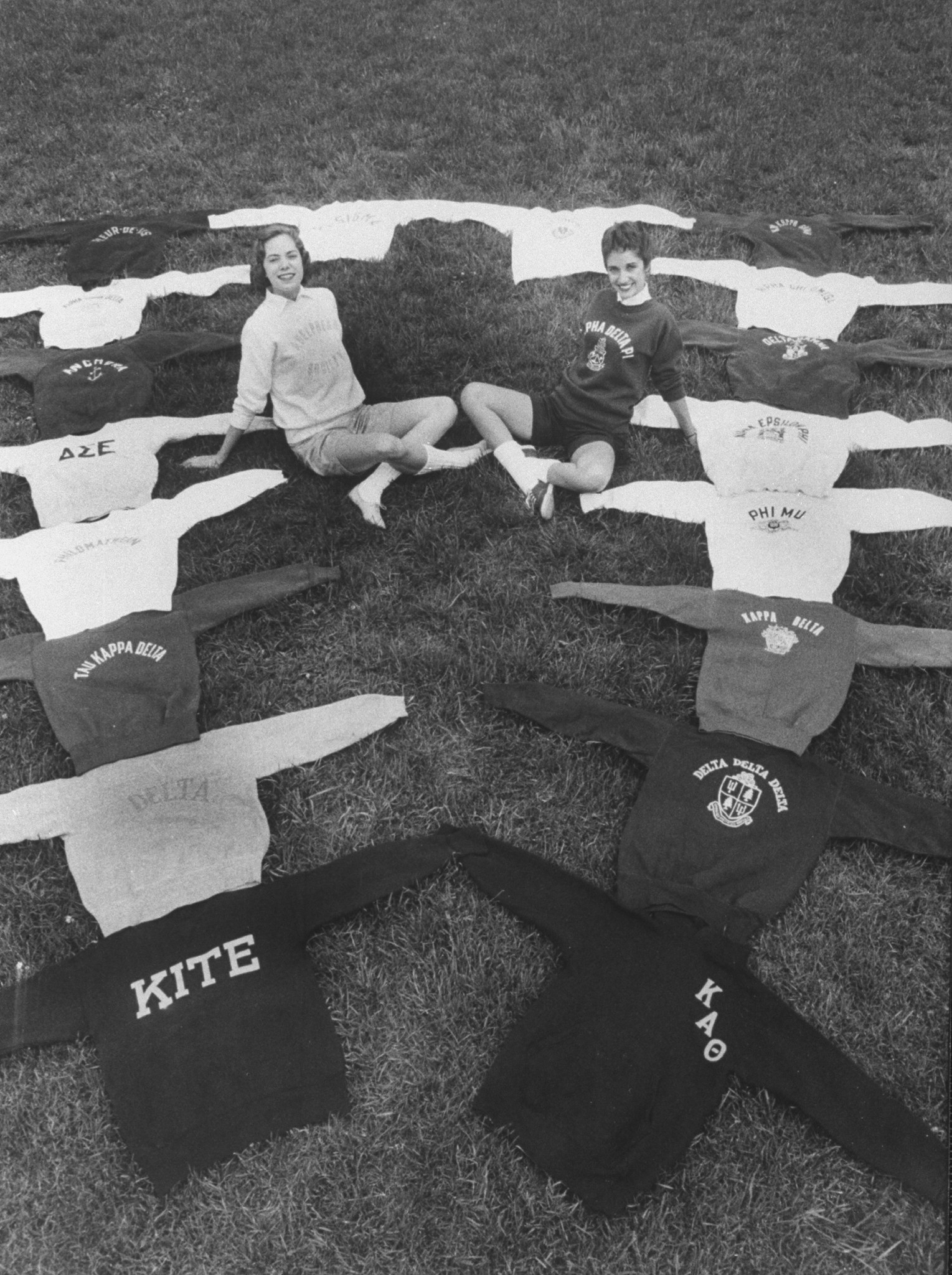
4. OK, that all seems pretty straightforward...
It does, doesn't it? And it...sort of is. But each step of the process is tightly choreographed, and the whole thing includes a ton of logistics, rules, and traditions that confuse the shit out of (and appear totally nuts to) people who aren't familiar with the process. There is a lot to keep track of — the University of Michigan's recruitment guidelines are 14 single-spaced pages long.
5. But...why?????
Um, because the Sorting Hat hasn't come to Muggles yet?
JK, it's actually about fairness, to a large degree. The rules — which are set and enforced by Panhel (also known as PHA), a sort of sorority-wide congress — are there to ensure that all PNMs are given a fair shot and feel welcome and comfortable, and that all the sororities are operating on a level playing field.
Despite the persistent stereotypes of mean sorority girls, they actually do want to meet you — and genuinely want people to like them and want to join their house. Having a full pledge class (each sorority has a quota to fill every year) literally secures a sorority's spot on campus. A full chapter more easily pays the rent for the physical sorority house, covers other necessary expenses, and ultimately keeps the executive office in the black. The desire to get "good" new girls is definitely driven by the social reputation ramifications (and is what motivates most active sorority members, TBH), but their national organizations also have a financial interest in rushing hard.
So with that in mind, consider that recruitment of any kind — recruiting athletes, employees, etc. — is a competition, and competition tends to make people act crazy, and tends to favor those who have the money to make grand gestures. So the seemingly arbitrary rules keep sororities from doing things that are stupid, irresponsible, and bad from a PR standpoint, or likely to get the sororities/universities sued. If a sorority is caught breaking the rules, they'll have to pay fines.

6. Got it! What are some of the main rules I should know about?
Mmkay, it all starts with the rule that prohibits bid promising, which is any kind of behavior that implies a liiiiitle too much interest on the sorority's behalf, makes a PNM think she'll definitely get a bid (a formal invitation to join the sorority), and encourages her to rank that house higher on her list. If she gets cut after you swore she had a spot, it's going to look pretty bad. And if other PNMs see you fawning over other girls and not them, they are going to feel bad or unwelcome, rank your house lower, and/or talk shit about you (and sororities in general).
"No bid promising" is one of the most important, ironclad rules of recruitment, and that trickles down into some other, more petty-sounding guidelines:
• No hotboxing. Although it sounds like some sort of drug- or sex-related activity, hotboxing is just when two or more sorority members take a PNM into a more private/isolated part of the house during a recruitment party. (Think: Everyone is in the formal living room, and then two sorority members invite a single PNM upstairs to ~chat~.) It's both terrifying for PNMs, and reeks of favoritism.
• You can't give PNMs any sort of gift. Now, obviously, a real “gift” like a T-shirt or an invite to come on your family's boat next weekend is the sort of thing PHA is worried about, but everything counts — so PHA will literally fine you if a PNM leaves your house with so much as a tissue. This leads to some very awkward grabs at the end of each round.
• No touching. No hugging or even shaking hands with PNMs. Aside from the fact that getting an embrace or affectionate tap on the arm from someone you just met is a little creepy, it can also make PNMs who don't get any physical contact feel left out. So if the girl who greets you at the door has her hands clasped behind her back, this is why.
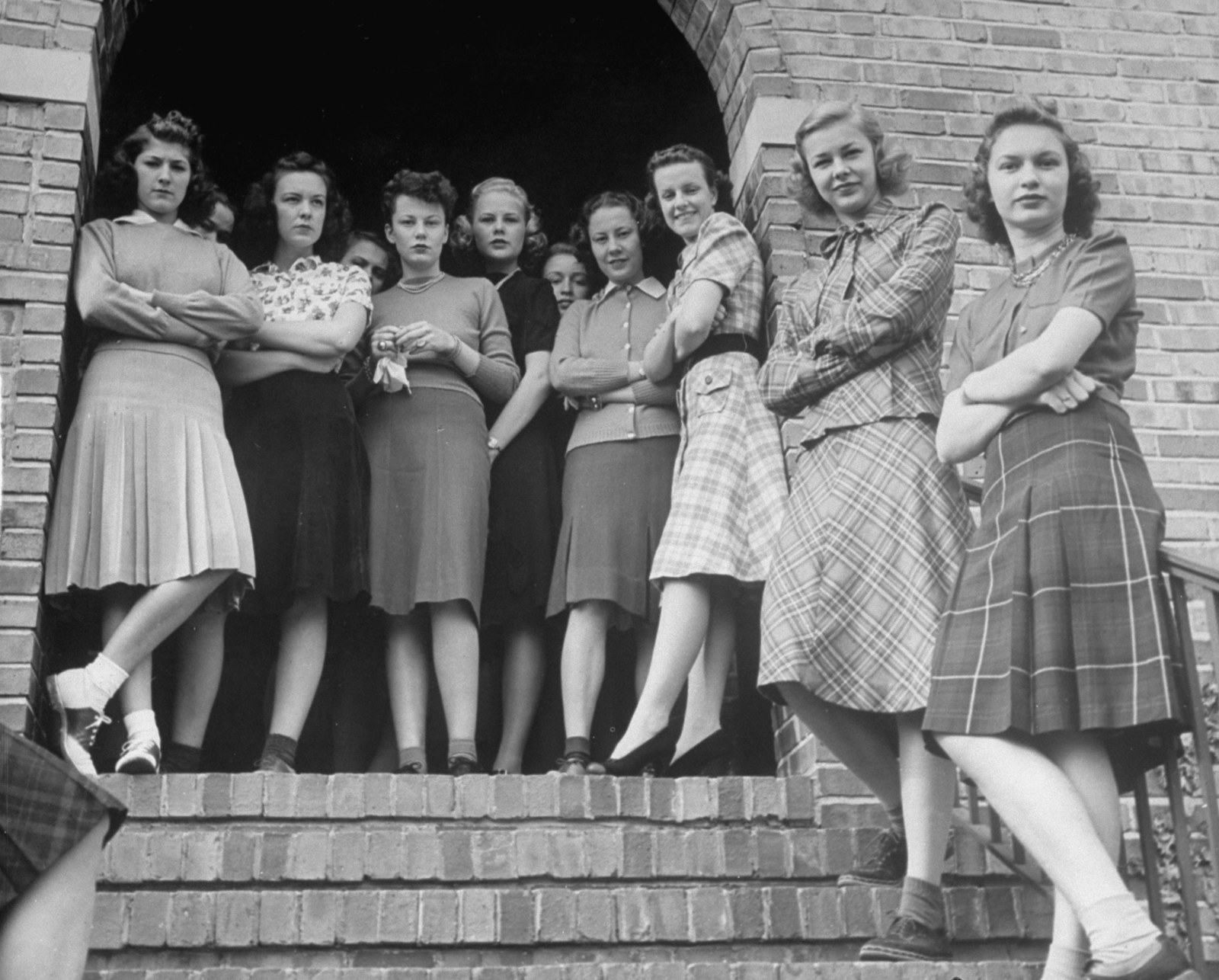
• No alcohol. Like, you can't even talk about it. If, during the requisite sorority life montage video that each chapter shows during recruitment, you spot weird some weird blurred-out blobs at hand-level, assume this is the reason — and that behind those blobs you'd find Solo cups and cans of Coors Light.
• No "I'll see you tomorrow" or "I'll see you later" when bidding a PNM adieu. This type of of seemingly innocuous statement falls under bid promising — basically, you're implying that you will see her tomorrow, which could be interpreted as her definitely getting invited back.
• Parties have a strict time limit. And a party is "over" when the last PNM is on the lawn and the door is shut. The house will be fined for literally every minute they go over (the recruitment counselors are on the lawns with their watches ready). That means that when the sorority member who is put in charge of watching the clock walks through and gives a subtle signal, your ass is going to be hustled to the foyer. If you basically get shoved out the front door, assume it's because they didn't want to get fined.
7. OK. Any other vocabulary I should know?
There's so much, but here are the most common/important terms:
• House: Another name for a single sorority or fraternity (Like, “What house is he/she in?”)
• Party: This may either refer to each individual recruitment event (“I have five parties today”) or the group of PNMs that visits a sorority during a particular time slot (“The next party is waiting outside").
• Dirty rush: a catchall term that refers to the ways sororities attempt to circumvent PHA's rules to try to get whoever the hell they want in their new member class.
• Chapter: The particular branch of a national sorority at each school. So, you’d say “The USC Pi Phi chapter” to differentiate it from Pi Phi at other schools.

• Bid day/bid night: The day you receive a card informing you which sorority invited you to be a new member. (If you’re going through formal recruitment, you’ll only get a bid to one house.) Many (but not all) sororities plan big events or parties on bid night, like bowling, hiring a hypnotist, or roller-skating. There will be lots of shrieking and singing, and TBQFH it is overwhelming as h*ck. You may also get a special new T-shirt (the first of many).
• New member: What people are called after they receive a bid but before they are officially initiated. They are NOT called pledges, but yes, they are what you would think of as pledges. A lot has changed since the days of Animal House, and this is a big one.
• “Mutual selection process”: The computer program that most big schools use to match PNMs to houses. After each round of recruitment, the PNMs rank the houses they went to in order of preference, and the sororities will rank the PNMs in terms of preference. Then there will be some bleep bleep bloop bloops, and just before the next round starts the next day, the PNM will get a list of the houses she’ll be going to during the next round (and the schedule of when she’ll be going to each), and each sorority will get a list of the PNMs coming through during that round. If this is starting to make your head hurt, you’re not alone.
• DOTS: Short for "depends on the school," and it's a term we just invented because we're going to be saying it a ton here.
8. I THINK SORORITIES ARE DUMB AND POINTLESS AND SHOULD BE BANNED.
Hi. Yes, right, of course. We'll come back to you later.

9. How long does it last?
Actual recruitment generally lasts for a week. And even though the process itself SOUNDS complicated as fuck, it’s actually pretty straightforward because it’s broken up into distinct days/rounds. Every sorority and university operates a little differently, but here’s a general overview:
Round 1: Groups of PNMs visit every single sorority and chat with 2 to 3 sisters at each. These "parties" are typically pretty short because the PNMs have so many sororities to go to, and they may take place in sorority houses or at booths in a ballroom or gymnasium, sort of like a really surreal, all-female career fair. At the end of the day, PNMs rank their favorite sororities using the ~mutual selection~ computer program, and vice versa.
Round 2: PNMs visit ~75% of sororities; the exact ones depend on how their rankings matched up with those of the sororities. Getting the shortened list of houses you’re going to during Round 2 can sting a little; you’re literally getting cut from houses based on less than 30 minutes of conversation! It’s very easy to think it’s all very superficial and arbitrary at this point, and sometimes, it is, TBH, but the process weirdly works in the end. Anyway, Round 2 is sometimes a day for sororities to present a speech and a video about their philanthropy, or the PNMs and sorority girls might do a little craft project that’s related to their charity. It might also be the first time the PNMs are seeing the inside of the sorority houses, which is always fun! If you go to a bigger school, Round 2 could be divided into two days, during which you go to, say, five houses the first day and four houses the second.
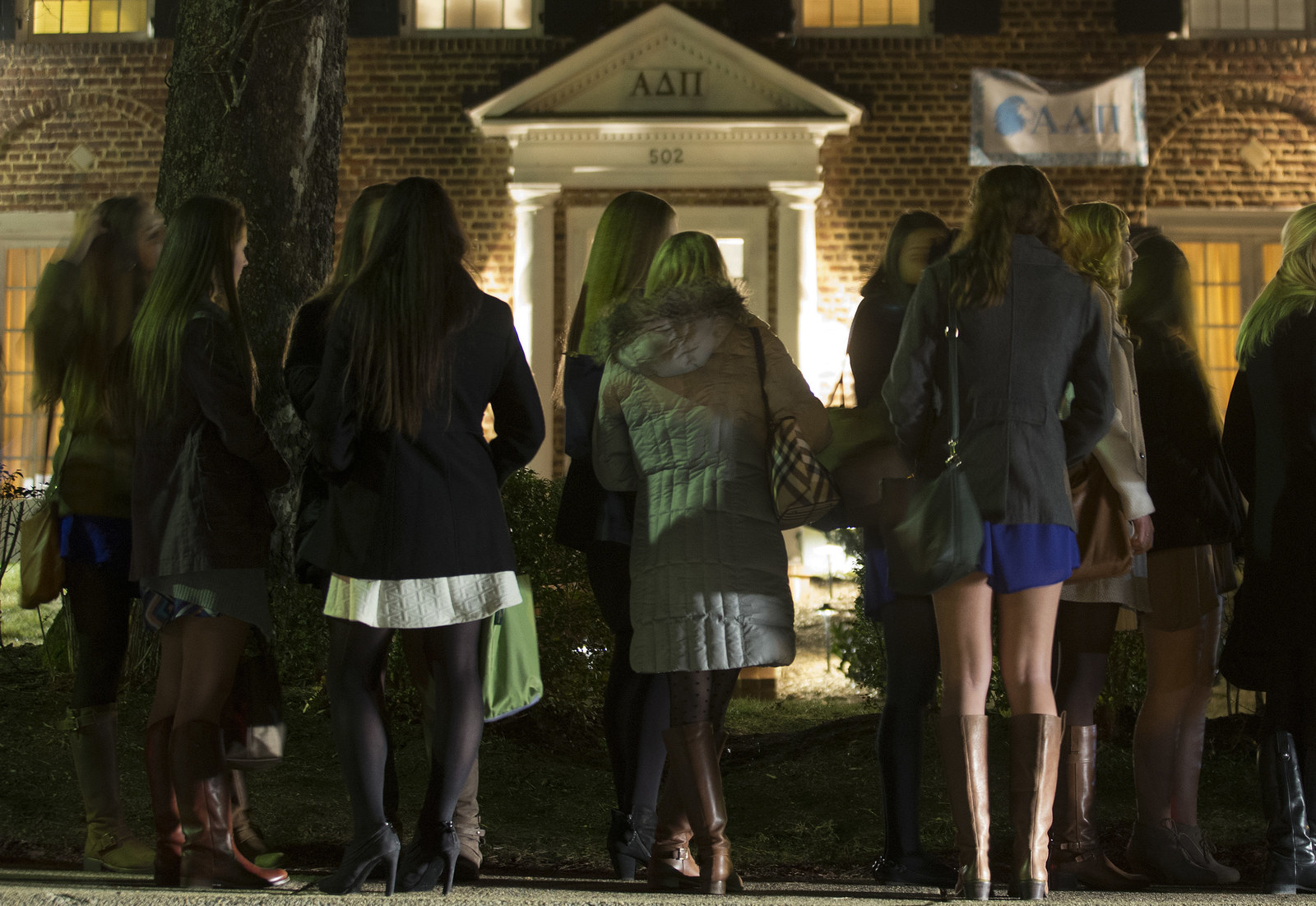
Round 3: Another day, another round of cuts. PNMs tend to visit ~50% of sororities, where they’re treated to more awkward chitchat, hopefully with new people this time. Again, DOTS, but Round 3 is sometimes skit day (sisters literally perform skits or songs about their chapters — it’s a whole thing) or a video day (where they show a video about how cool and fun their house is). Round 3 may include a house tour (the girls are taken upstairs and shown some of the different bedrooms, study areas, and “get ready rooms”). It’s sometimes philanthropy day. Or it may be something else entirely.
Round 4: This is the legendary pref night, the evening when PNMs visit up to three sororities that the mutual selection process has led them to. It is very rare for a PNM to be thrilled about all of the houses she’ll visit that night, but such is life. Every house has a different pref night ritual, which is often imbued with the sororities’ tradition and lore, and some kind of sendoff for the seniors. The sorority girls typically all wear black cocktail dresses and sing soft, pretty songs (instead of the wailing chants they’ve been doing all week) and there are a lot of candles*. It’s honestly a pretty awkward night for PNMs, because things go from being loosey-goosey “fun” to extremely formal and almost somber. PNMs talk to at least one sister who they’ve already met and, unlike the other days when everyone is supposed to keep it cool and play hard to get, the members of the sorority try to hard sell you on their house without crossing the line. The PNMs will definitely hear many times "I can definitely see you being happy here" and things of that nature, and at the end of the night, they rank their favorite houses one last time. Meanwhile, the sororities change from their black dresses into their pajamas and head into their “chapter room” (meeting room) for a process called "member selection" or MS. It’s going to be a long night for them, and especially for the VPM.
*Depending on the house, the candles may be fake, which makes these rituals very, very awkward. Like *many* of the weird things sororities do, this is related to house insurance/liability.
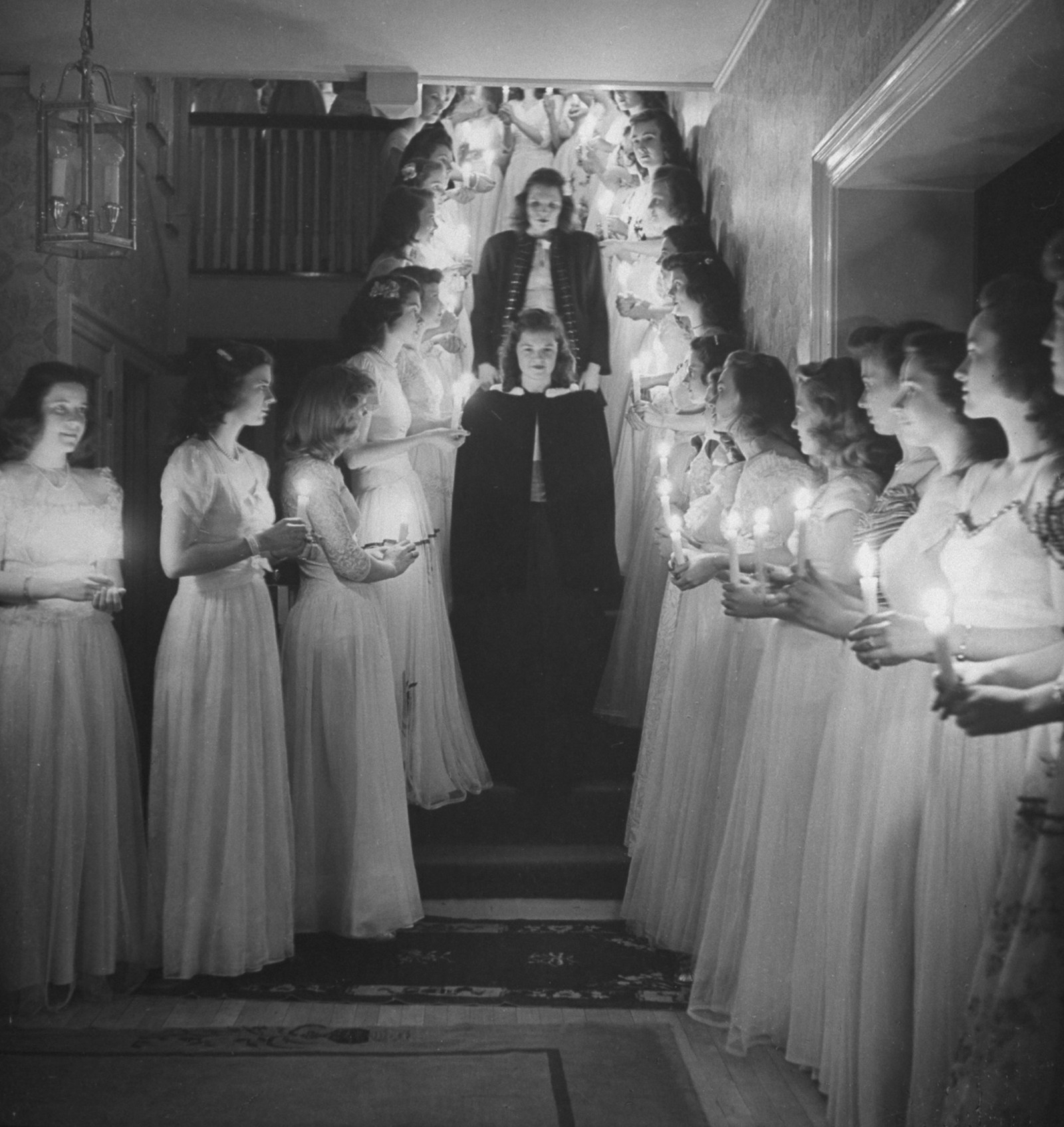
10. How do the sororities prepare for it?
They practice! Recruitment practices typically start the week before school begins, and each session may run 6 to 8 hours. It sounds wild, but there's actually a lot to cover. There are meetings in which the VPM goes over any major rules and requirements and also tons of details that sound ridiculous/insignificant to outsiders, but matter a great deal (because of the aforementioned fines). Some sororities also have to plan skits and songs to perform; these songs are often Top 40 or nostalgic hits with the sorority name squeezed in, which is exactly as stilted and forced as it sounds. They'll also probably spend an entire day going over how to line up at the door/on the stairs properly, and working on their door chants. (And they are often doing this in August, in a 100-year-old house without AC.) It's...a lot.
View this video on YouTube
11. Oh my god, I'm sweating. Anything else???
Yes; they spend a ton of time practicing how to actually talk to PNMs — what to say and especially what not to say. Most sororities use "the five B's" as the gold standard of off-limits conversation topics. The Five B's are as follows:
1) Boys (So, no "We were Greek Week partners with Sigma Nu last year and they are sooooo hot.")
2) Booze ("We were so wasted at tailgate!" "Do you like to drink?")
3) Bank accounts ("What does your dad do?")
4) Bad news ("Feline AIDS is the number one killer of domestic cats")
5) Bush/Barack, aka politics
They also practice bumping for several hours.
12. Wait, did you say..."bumping"? For...hours?
Yeeeeuuuup. "Bumping" is how the sorority members rotate among the PNMs so they can talk to as many PNMs as possible, and so the PNMs can meet as many of them as possible.
Basically, sorority members at each house are divided into small "bump groups," and all members of the bump group will talk to the same PNMs during a party. The bump groups are predetermined by the VPM, and designed so that each PNM meets a range of personality types from the house. While it may seem creepy and calculated, it's actually a pretty genius and effective way of talking to a large group of people in a short amount of time, and it ensures that the PNMs will never get stranded or feel left out.

13. I don't get it.
OK, let's say you walk into a house for a party and are immediately greeted by Mary Ann — who, unbeknownst to you, is in position #1 in her bump group's order. You and Mary Ann will chat for a few minutes, and then OMG, her friend Kristy (#2 in the bump group) is here! Mary Ann will introduce you (you were just talking about belt buckles, which Kristy loves!) and then Mary Ann and Kristy will talk to you two-on-one for a few. Then Mary Ann will find a way to politely excuse herself ("It was SO great to meet you! I'll let you two get to know each other better!") and you and Kristy will get a few minutes alone to chat! And then — oh, hello, it's Kristy's friend Stacey (#3)! The process repeats itself. Meanwhile, Mary Ann has gone to find and bump Claudia, who is #5, aka the last position in the bump group.
And that, my friends, is how bumping is done. It's meant to seem very seamless and casual, and when it's properly executed, it leaves the PNMs in awe of how easy it was to talk to so many people. It's actually sort of amazing how many PNMs don't realize how it works until they are on the other side of it the following year.

14. So is it predetermined who I talk to in each house?
Eh, yes and no. The bump groups ensure that you'll really only talk to those people (plus some "floaters" — basically, seniors who are over this shit and don't have to be in bump groups anymore/can just crash any conversation). Some sororities look at the party list in advance and coordinate which bump group will talk to which PNM, so that a PNM they really like gets run through the "best" bump group. It’s incredibly tricky to work that out exactly, so most sororities just line their girls up in a set order with the bump groups evenly distributed (so, all the #1s, then all the #2s, then all the #3s, etc.), and hope for the best.
15. Do fraternities do it this way too?
No. Lol @ the idea of fraternities being this organized or giving a shit about rules.
16. Why are they all screaming at me in the doorway, and how do I make it stop?
Oh right...that.
So, that is known as a "door stack" and it's apparently been around for decades. Sororities and fraternities have a long history of courting each other through silly songs about how awesome their house is and how much they adore the objects of their song, and it has evolved into a thing where the girls sing to court new members, which is actually kind of cute (in theory).
The sororities spend hours practicing their door stacks — getting in the right positions so there are no gaps, clapping on beat, and knowing when to wrap it up. This is pretty complicated during the actual parties because there's no one outside/in front of the house who can cue the girls that this is the last round of the song — the number of rounds they sing changes for each party, depending on exactly how much time they have left before the clock runs out — so it has to come via a secret cue from a girl in the back and it's a Whole Thing that they devote a not-small amount of time to perfecting.)
USC's Panhel banned the practice in 2014 because apparently a lot of door stacks involve excessive head bobbing, and girls were smacking their heads into each other's and/or hitting the door frames and getting concussions. ¯\_(ツ)_/¯
Anyway, if you're a PNM bearing witness to the door stack, just smile politely. Uncross your arms. It'll stop eventually. And we swear it looks less batshit IRL, and is actually weirdly charming — it's very similar to being seated in the front row, right in front of the cheerleaders at a football game.
View this video on YouTube

17. What should I wear?
It depends on the university/the time of year, but “Sunday best” is always a safe bet — a cute, not-too-formal dress, or a skirt or pants with a nice top, plus booties or heels or whatever kind of fun footwear you own. (At Michigan State, this dress code was referred to as “snappy casual” — or just “snappy caj,” because if there’s one thing sorority girls love, it’s abbrevs.) For preference, you’ll probably want to dress up a little more. At northern schools that do winter recruitment, it’s not unusual to wear heavy winter coats and Uggs in between houses, and then change into better shoes and wriggle out of your coat right before dashing inside. And FYI, don't stress about carrying a cute/expensive purse; at a lot of schools, you'll have to leave your bag outside on the lawn with the recruitment counselors while you go to each party anyway.

18. What will the ~sorority women~ be wearing?
Again, DOTS. Generally speaking, sororities follow a predetermined dress code: PHA-supplied T-shirts (same design, but each house in a different color) for Round 1, and coordinating, but not matching, snappy caj outfits during the following rounds. (So, for example, all of the Chi Omegas may wear black-and-white outfits with pink accents/accessories; all of the Kappas might be in sundresses; and all of the Tri-Delts might wear cute jeans, white tees, and colorful heels.) And then on pref night, pretty much all require their members to wear black dresses. (And pantyhose, if their advisers are old school.) All of this will be spelled out for the sorority members in a letter at the beginning of the semester — a letter which will hopefully *not* be like this one.

19. Why do all the girls in the same house low-key look alike?
It's true: Many sorority composite photos have a Stepford Wives quality to them, made worse during recruitment when they are literally all dressed the same. Some of this is because people recruit new members the way they find new friends; people tend to gravitate toward people who look like them, for better or worse. But it’s mainly because once you start living with people, you tend to pick up on their style (especially if you’re sharing clothes or doing each other’s makeup and hair) and develop a sort of shared culture and look.
20. Speaking of "a shared culture and look"...I’m not white. Is that going to be a problem?
It depends. The NPC sororities (and their fraternity counterparts) in the south are notoriously white and resistant to integration and it’s pretty fucked up. But in the year 2017, we should all know better than to pretend that only the south is racist! Around the US, the overrepresentation of white people and level of racism in a Greek system really depends on the school and the individual chapters.
At Northwestern, a school with a very homogenous student body, sororities were pretty lily-white — but Terri remembers many houses vying for more diverse pledge classes as a way to break their stereotypes. At Michigan State, Rachel could count the number of black women in the (non-historically-black) Greek system on one hand the entire time she was there. (She was one of them!) It wasn't actually because WOC were getting rejected — it was because very few were going through recruitment at all. (Which is...underfuckingstandable???)
We could honestly talk about this for hours, but for now we'll just say that racism in the US is always a potential problem, especially when it comes to institutions that were founded on exclusivity and elitism.

21. I think a girl blacklisted me in her house!!!
Again, this very much DOTS, but a lot of sororities strongly discourage blacklisting and/or make it damn near impossible. They want PNMs to have a fair chance, and really aren’t interested in cutting people for petty reasons. If you don’t get invited back to a house, it’s more likely that the people you talked to just weren’t as crazy about you as you thought, or they liked other girls better.
In Rachel’s house, if you had a legitimate reason to blacklist someone, you could go to their adviser (a 70-year-old alum from the Deep South who wasn't here for any bullshit) and privately and speak to her about it. If she felt the reason was valid, she would pull the girl from the lineup and no one else from the house, including the president and VPM, would know it happened. And a legitimate reason is not, like, "We went to the same high school and I heard she's kind of a bitch." It would need to be something on the level of "I personally witnessed this girl do cocaine last week" or "This girl’s mom slept with my dad and it led to my parents' divorce; if she gets a bid, I will deactivate."
22. Does being a legacy really matter/count?
Yes! If your mother, grandmother, aunt, sister, or any other close relative was in a sorority at any school, you definitely have a better chance of getting into their sorority! Generally, they tell someone — either the campus chapter or the national organization — that you’re a legacy (and you'll check a box when you're signing up for recruitment) and then, if you make it past the first two or so rounds of recruitment at that house, you’re pretty much guaranteed a bid. When Rachel was VPM, if the chapter wasn’t offering a bid to a legacy, she had to personally call the alum who was related to her and tell her in advance. Fun stuff!
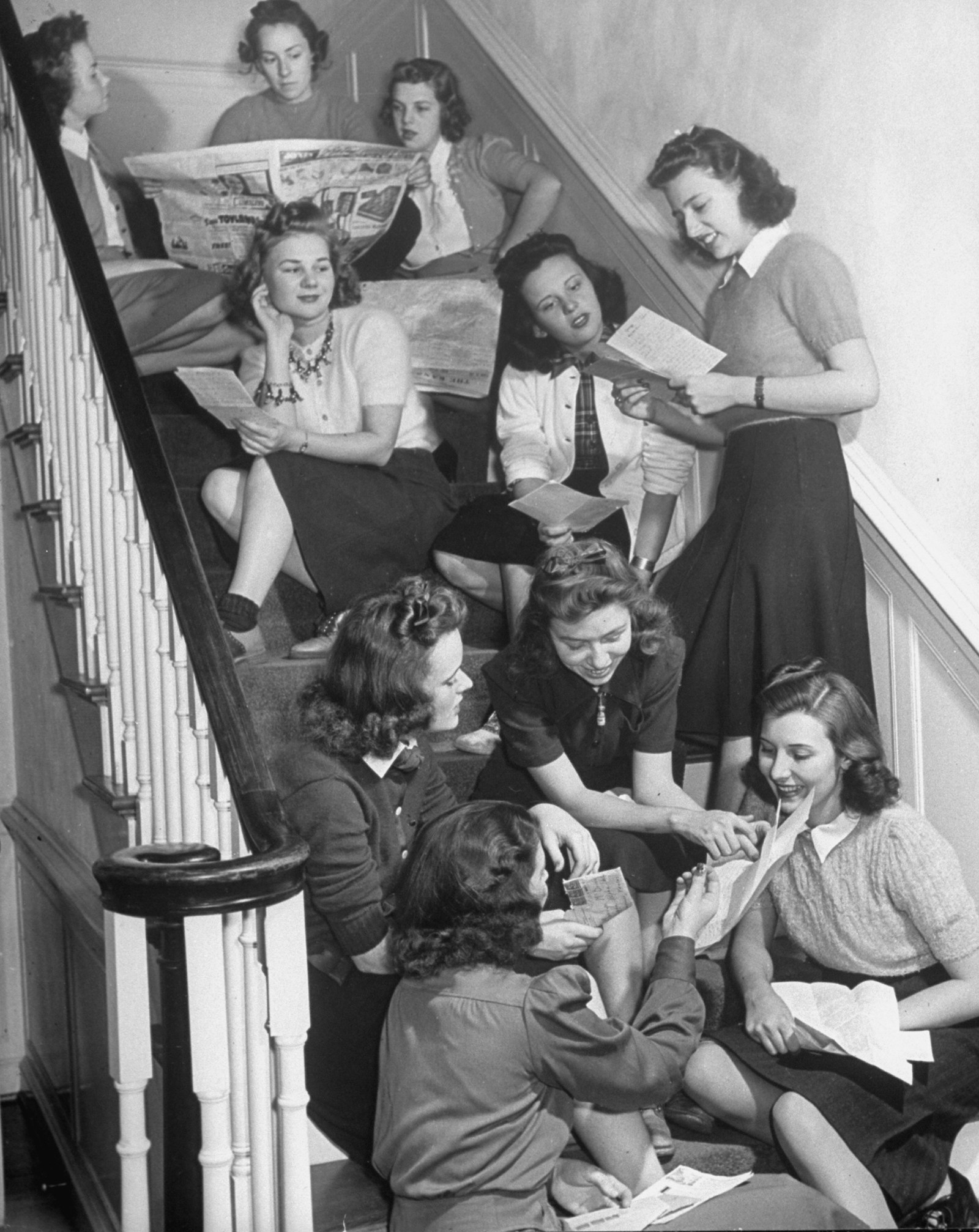
23. I want to be in a cool house!!!!!
I mean...good for you? Going into recruitment with a one-track mind often means that you overlook the less “cool” sororities that, in turn, don’t want you because you seem like a status-obsessed dick.
Related: One thing you probably shouldn't do, though, is listen to other people about what houses are "good." Your friends might tell you they're all preffing Kappa Delta, but by no means does that mean it's the right sorority for you. Men also love to weigh in — e.g. "DGs are so fucking hot" or "Chi Os are all wifeys" — and please, we beg of you, ignore them. You're the one that'll be miserable if you join a house that's a bad fit, not them. Also, in our experience, people on the outside have noooooooo idea what they are talking about.
Basically: Keep an open mind and don't be too thirsty. Just...be cool, guys.

24. Are they judging me?
Yes, obviously? It’s not pleasant to think about it that way, but ultimately, recruitment and judgment go hand in hand. Whether you like it or not, you will get talked about in a dimly lit basement on campus filled with women in topknots and sorority sweatpants. That much is a guarantee. But it's truly, truly not all bad — there is much singing of praises and many proclamations of “I would be proud to call her my sister” — but, generally, it’s best to not obsess over what they may like or dislike about you, because TBQFH, if they don’t like you, you probably don’t like them.
25. What if I don’t get the house I wanted?
Life will go on. For starters, you don’t have to accept a bid from a house that you really, truly, do not feel is right for you. If you want to give it a try, you can accept the bid, start the new member period, and then ultimately decide whether or not you want to initiate in a few months. If you choose not to be initiated, that's fine! You can try recruitment again next year and see how it goes. (If you do choose to initiate, then you cannot rush another sorority ever.) Ultimately, these things tend to have a way of working out — and if they don’t, it will still really be okay, promise.
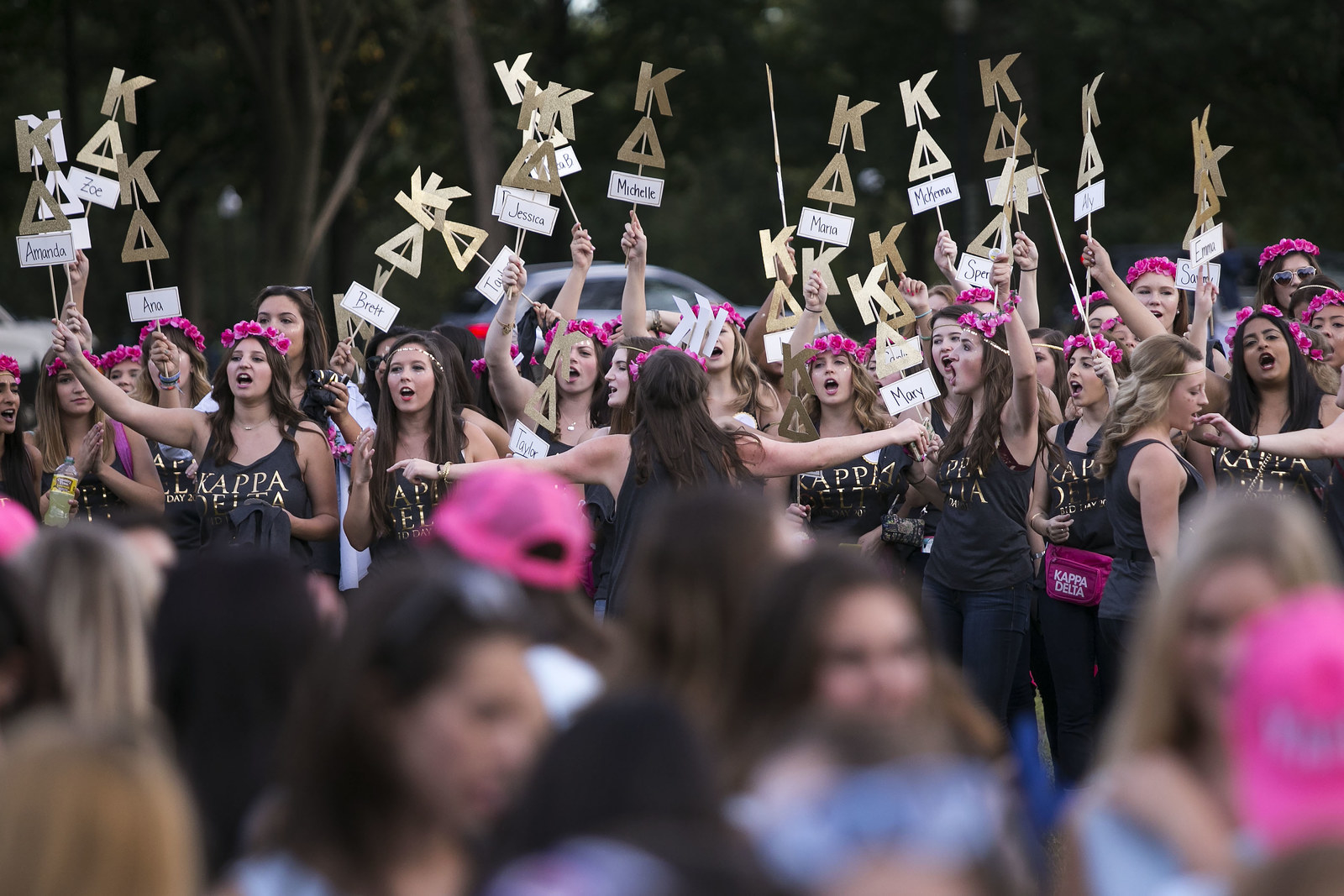
26. HI, IT'S ME AGAIN I STILL THINK SORORITIES AND FRATERNITIES ARE STUPID AND POINTLESS AND ANTIQUATED AND DANGEROUS.
Honestly...that's fair. Capitalism and the patriarchy have created some pretty problematic and hard-to-defend institutions that still bring the people involved a lot of joy and satisfaction and change their lives for the better. (We're lookin' at you, NCAA and NFL!) Greek letter organizations absolutely fall into this category.
We're not going to brush real problems like binge-drinking, sexual assault, racism, and eating disorders under the rug. What we can tell you is that these problems are pretty similar to what you'd experience/expect on a college campus. Greek life is definitely a factor (again, DOTS), but rarely is it the dramatic den of iniquity you see on Law & Order: SVU; it's just that the boring, day-to-day experience of mostly normal people isn't what makes the news, or what becomes the stuff of urban legend. Sororities and fraternities absolutely shoulder some of the blame for these problems (particularly those related to hazing, a practice that is truly indefensible), but if you think that it's the only facilitator of binge-drinking, sexual assault, and racism on college campuses, boy, do we have some bad news for you. There is a lot of work to be done by a lot of organizations.
We're also not going to sit here and tell you that sororities and fraternities are OK because they do so much philanthropy. Sororities are, ultimately, social organizations that are about making friends, dating, and having fun with people who you find commonality with. And even though they do raise thousands of dollars for charity each year (it's honestly kind of stunning how much money gets raised), there are plenty of less problematic ways to give back to your community, if that's your main goal — ways that don't involve being judged by a bunch of frat boys or paying hundreds (or thousands!!!) of dollars in dues every year.
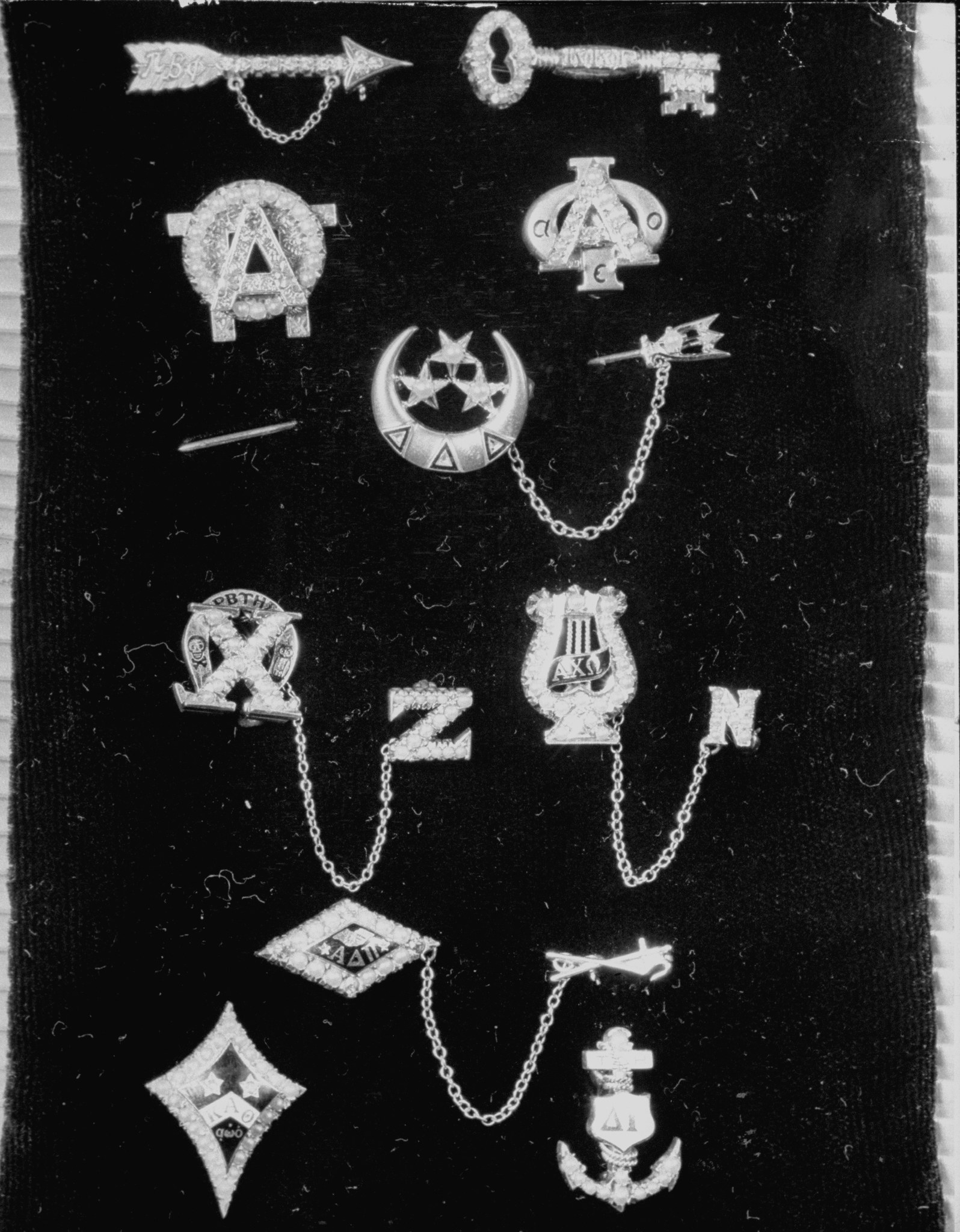
27. This sounds exhausting and tedious. Is it worth it?
I mean...Rachel can still sing the entire Greek alphabet, and Terri's a master of the sorority squat, so uh, YEAH, we'd say it's worth it???
Jokes aside, there are some incredibly fulfilling aspects of being in a sorority: Lifelong friendships, leadership opportunities, and...oh god, I sound like a pamphlet, don't I? But the truth is, if we hadn't been in sororities in college, we would have still found a way to make friends to study and hang out with and be drunk and slutty with. Life finds a way! Joining a sorority isn't for everyone, and the entire point of recruitment is to figure out if it's right for you.




